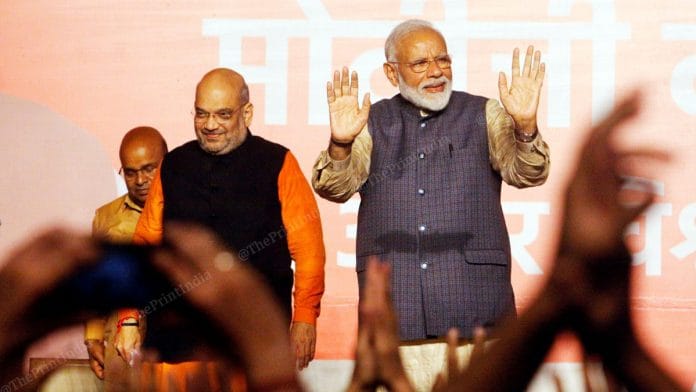New Delhi: Rajasthan’s Rashtriya Loktantrik Party (RLP) quit the National Democratic Alliance Saturday over the new farm laws, becoming the 19th party to quit the ruling coalition since 2014.
In episode 650 of ‘Cut The Clutter‘, ThePrint’s Editor-in-Chief Shekhar Gupta discussed how the BJP’s use-and-discard strategy is transforming national politics and how Narendra Modi-Amit Shah’s coalition dharma is different from Atal Bihar Vajpayee’s coalition dharma.
There is an emerging trend that the BJP no longer cares for coalition partners and cares less about ‘coalition dharma’, Gupta said.
He picked up “four straws” blowing amid this “political wind”. First, Rajinikanth’s decision not to enter politics. Gupta said Rajinikanth has made more flip-flops in politics than any of the Lals — Bansi Lal, Devi Lal, Bhajan Lal — made in Haryana’s chequered political history.
Second, a sense of unease emerging in Bihar from the JD(U). New JD(U) president R.P. Singh has said a few things, Nitish Kumar has repeated that he is not desperate to be the CM, and his party has questioned “anti love-jihad” laws.
Third, RLP convener and MP Hanuman Beniwal announced the party’s exit from the NDA alliance over the farm laws. Initially, the BJP had teamed up with the RLP as part of its larger plan to consolidate the Jat vote in Rajasthan but as the BJP has grown stronger, Beniwal probably realised he would be discarded and has left beforehand, Gupta explained.
Fourth, Shiv Sena has been attacking Rahul Gandhi and the Congress party consistently. Whispers are coming out from Maharashtra that key people from the NCP and the Shiv Sena are reaching out to other Opposition parties. These whispers are building up case for Sharad Pawar to be the chairman of the UPA or a new Opposition alliance. This is because the Congress is being seen as a liability or unreliable coalition leader or partner, Gupta said.
NDA has lost 19 political allies since 2014
RLP is the latest party to leave the NDA. It joins Shiromani Akali Dal (SAD) in Punjab, Shiv Sena in Maharashtra, Telugu Desam Party in Andhra Pradesh, and Suheldev Bharatiya Samaj Party (SBSP) in Uttar Pradesh, among the 19 allies that the NDA has lost since 2014.
Gupta explained this is happening because, given PM Modi’s popularity, the BJP feels it doesn’t need allies and thinks it has the “strength now to grow into everybody’s turf”. For example, it conquered Uttar Pradesh “by salami slicing its caste base”. It partnered up with the SBSP, knowing it represents an OBC community called Rajbhars and holds 17-18 per cent of the vote in eastern Uttar Pradesh. But, in the course of time, SBSP left the NDA as they felt they were not getting their due, added Gupta.
In Bihar, BJP, which was once an outsider, is growing into its partner’s territory, to the point where JD(U) leader and CM Nitish Kumar needs the BJP to stay in power. Similarly, in Maharashtra, Shiv Sena realised the BJP’s vote share was increasing election after election and pulled away at that point. “It was strategic as much as an act for immediate power,” Gupta noted.
Also, six JD(U) MLAs joined the BJP in Arunachal Pradesh — a state where the BJP already has a strength of about 41 seats out of 60. That’s like robbing an ally and expecting them to put up with it because they are an ally when that only breeds resentment, said Gupta.
Also read: NDA just lost its 19th ally since 2014, but here’s why Modi-Shah pretend they can’t care less
Equation has reversed
Gupta also compared the current trend with Vajpayee’s leadership during the coalition era. Unlike BJP under Vajpayee, it is Modi’s coalition partners that need him and his party to survive in their own state. So the equation has reversed, said Gupta.
Also, Vajpayee was living in a time when parties that wanted a chance at the Muslim vote, did not want to align with the BJP. Also, Vajpayee was so open-minded that he even had one coalition partner represented in his Cabinet Committee on Security, Janata Dal’s George Fernandes, as defence minister. However, the situation is now the opposite where more and more parties want to be friends with BJP and, in fact, Congress is finding it more challenging to maintain coalitions, he added.
BJP under Vajpayee needed coalitions to expand its base in the states, but their success was limited. But today, because of Modi’s mass appeal, BJP uses regional parties like steps on a ladder, said Gupta. It partners with them, then uses its own resources and the mass appeal of Modi to enter a new political territory and smaller parties are left feeling threatened, he said.
Building an anti-NDA coalition at this point requires a party or leader who will “rally all the troops”, including those defeated regional players which is where NCP chief Sharad Pawar comes into the picture, he said.
“People know he is astute. He has always been a 24×7 political player,” said Gupta, adding that other parties don’t see him as a threat having dealt with a domineering BJP.
Watch the full episode here:







Congress-China paid media has nothing left to criticise the Govt, so they publish silly spacefilling articles like this one.